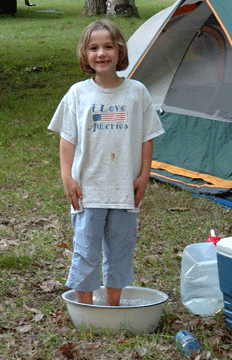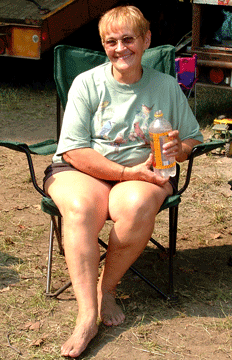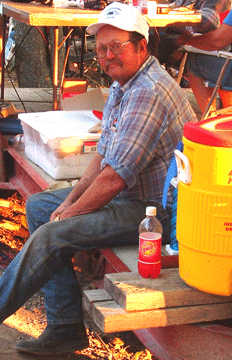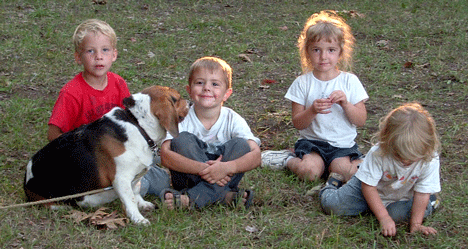I said I wanted to meet people who aren’t like me. Barb and her family are nothing like me. Family is important to them. Barb is “aunt Barb” to everyone, and she dotes on all of the children, delighting in hugging them and kissing them in the “secret aunt Barb spot” on the backs of their necks that no one else can reach. Jeremy, who is almost twelve, was slightly embarrassed to admit that she had done the same to him, and denied that his aunts had changed his diapers when he was a baby, but he put up with his aunt's friend Cookie teasing him and tickling him behind the ears and fussing over his fuzzy haircut as if he were a puppy. One day he tied a string of toboggans behind one of the garden tractors and drove a whole train of small children through the campsites, picking up more toboggans and children as he went, and attracting the delight of the adults wherever they drove.
Everyone was incredibly accepting of my presence. At first I was a stranger among them, but that didn’t last long. Marilyn and Sue spent a lot of time sitting around the fire pit, and it quickly became natural to sit down with them and join the chatter. It took a couple of days to meet everyone, but by Sunday someone introduced me as Barb’s friend, and to my pleasure Kerry said no, I was everyone’s friend. Jason and I got into a political discussion that had his wife Shelley rolling her eyes, but then we were happy to disagree on everything but still get along.

A few of these folks are farmers, but many have other jobs. Jason is a truck driver, spending the weekdays on the road and returning to his family on weekends. Others are mechanics, heavy equipment operators, other work that takes physical skills and mechanical knowledge. Shelley raises three children and manages the household. Kerry operates construction equipment. Melanie is studying to be a nurse. She told me that she did it backwards, having her children first and then going back to school, but that she never would have known when she was younger that she might want to go into nursing. Barb has been a postal worker for twenty one years. Sue has an administrative position in an office in Grand Rapids, one of the few with a white collar job.
Monday night, after we returned from the fair, Barb and I talked about her family and their life choices. Like me, she seems somewhat disturbed at the willingness of the young people to have children without fully assessing the commitment involved. She told me that when her nieces and nephews were teen-agers she offered to help them with birth control, promising never to tell their parents, so that they wouldn’t get trapped by children before they were ready. None took her up on the offer, though. Unlike me, Barb is comfortable with their array of blue collar jobs, though less comfortable with the financial dependence of many of the women on the men in their lives and with some of the unfortunate choices of men they have made. She has never married or had children herself. She described her own background as upper middle class, and said her parents were devastated when she dropped out of college for lack of any interest strong enough to feel that studying was worth the effort. Her own work history has been of unskilled jobs, but she has not depended on the men in her life to support her. She’s tired of working now, though, and is looking forward to retiring early, selling her house, and moving into her van in the spring.


